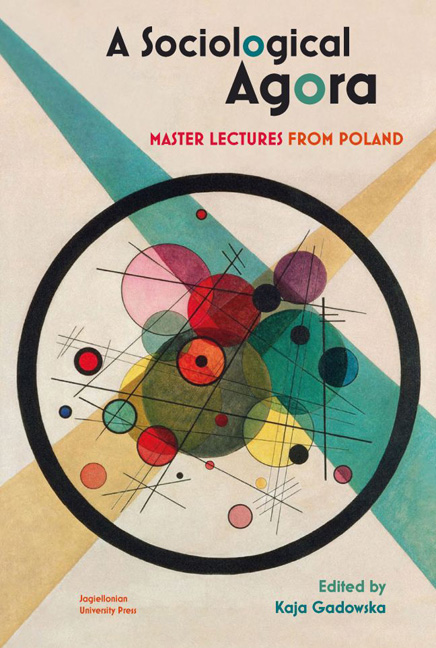Book contents
- Frontmatter
- Contents
- Society in a Time of Pandemia: Postmodern Problems from a Social and Humanistic Perspective
- Trust and Risk in the Time of Pandemia
- The Mythologized Populist Imagination, Carnival Rebellion, and the Fate of Liberal Democracy
- Applied Feminism: Women’s Rebellion and Identity
- On Law and its Interpretative Artifacts
- On Legal Nihilism Once More: Lessons from Poland
- Minima iuridica: Reflections on certain legal (un)obviousnesses
- Community—Meaning What?
- An Essay on Welfare: Problematic and Debatable Issues
- Sources of an Ecclesiastical System Success
- About the Authors
- About the Editor
- About the Translator
- Polish Sociological Association
Trust and Risk in the Time of Pandemia
Published online by Cambridge University Press: 01 March 2024
- Frontmatter
- Contents
- Society in a Time of Pandemia: Postmodern Problems from a Social and Humanistic Perspective
- Trust and Risk in the Time of Pandemia
- The Mythologized Populist Imagination, Carnival Rebellion, and the Fate of Liberal Democracy
- Applied Feminism: Women’s Rebellion and Identity
- On Law and its Interpretative Artifacts
- On Legal Nihilism Once More: Lessons from Poland
- Minima iuridica: Reflections on certain legal (un)obviousnesses
- Community—Meaning What?
- An Essay on Welfare: Problematic and Debatable Issues
- Sources of an Ecclesiastical System Success
- About the Authors
- About the Editor
- About the Translator
- Polish Sociological Association
Summary
AN EXISTENTIAL UNCERTAINTY
The astute reader will quickly register a paraphrasing of the title of Gabriel Garcia Marquez's celebrated novel, Love in the Time of Cholera. Still, this article will not be a literary work, but one of sociology. Moreover, whereas there was no need for Marquez to explain love, I must, in this introduction, shed light on my understanding of the categories of trust and risk. This text will, therefore, open with general considerations—both conceptual and theoretical—so as to lay the foundations for putting these categories to use while analyzing the pandemic situation in the world, but, above all, in Poland.
One might begin with the fact that human fate is full of uncertainty, peril, and menace. It was already in the 17th century that Thomas Hobbes observed in his classic, Leviathan that “the life of man [is] solitary, poor, nasty, brutish, and short.” Much subsequent philosophical thinking has entailed interpretation of the simple fact that life is always passing under the sign of that final and inevitable bane of existence: death.
Some threats are of an external nature, totally beyond our control: earthquakes, tsunamis or epidemics. Other threats are unintentional and unforeseen consequences of our own actions. Regarding the latter, key is the category of civilizational threats incurred by mass behavior, but affecting the individual: automobile accidents, nuclear plant failures or environmental pollution.
Yet risk is something different from dangers and hazards. Risk involves the possibly fatal outcomes we bring to bear upon ourselves through our own behavior. In this sense, we are at fault for the consequences which we take into account, but despite which we continue. This distinction is expressed well in Polish (and other languages) in phrases such as that we encounter a threat or come across danger, but undertake or take a risk.
Trust, in turn, is a panacea for uncertainty and risk since, despite everything, we must or want to act. Speaking metaphorically, trust is a bridge over the chasm of precariousness. In other words, it is an optimistic bet placed on the future, indeterminate actions of others.
- Type
- Chapter
- Information
- A Sociological AgoraMaster Lectures from Poland, pp. 23 - 32Publisher: Jagiellonian University PressPrint publication year: 2023



